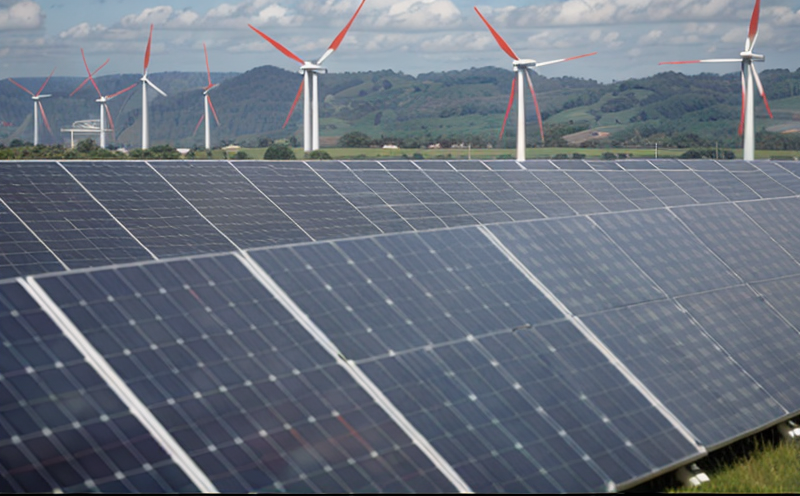Pyrolysis Product Analysis
The analysis of pyrolysis products is a critical aspect within renewable energy systems, particularly in agriculture and forestry testing. Pyrolysis involves the thermal decomposition of organic materials under anaerobic conditions to produce bio-oil, char, and gases. This process plays a significant role in the conversion of biomass into valuable energy resources without the need for combustion.
The primary goal of pyrolysis product analysis is to quantify and characterize the components present in the bio-oil, gas, and char produced during this process. The analysis helps in understanding the efficiency of the pyrolysis reactor, optimizing operating conditions, and ensuring compliance with environmental regulations. This service is particularly valuable for quality managers, procurement teams, R&D engineers, and compliance officers aiming to ensure the highest standards of product integrity and sustainability.
The analytical techniques employed include gas chromatography (GC), Fourier Transform Infrared Spectroscopy (FTIR), and mass spectrometry (MS). These methods allow for the identification and quantification of various compounds such as alcohols, carboxylic acids, ketones, and aromatics in bio-oil. The analysis also includes the determination of volatile organic compounds (VOCs) present in the gases produced during pyrolysis.
For char, the analysis focuses on elemental composition, ash content, and surface area measurement using techniques like X-ray fluorescence (XRF), thermal gravimetric analysis (TGA), and Brunauer-Emmett-Teller (BET) adsorption methods. This information is crucial for assessing the potential of chars as carbon materials or soil amendments.
The service involves a comprehensive approach, starting with sample preparation, which includes drying, crushing, and homogenization of biomass samples. The prepared samples are then subjected to pyrolysis in a controlled environment. Post-pyrolysis, the products are collected and analyzed using state-of-the-art instrumentation. Our laboratory adheres strictly to international standards such as ISO 17025 for quality assurance.
Our team of experts ensures that all analyses are conducted with precision and accuracy, providing reliable data that can be used to optimize processes and improve product performance. This service is essential for stakeholders in the renewable energy sector who aim to harness sustainable biomass resources effectively.
Scope and Methodology
The scope of pyrolysis product analysis encompasses a wide range of parameters that are crucial for understanding the efficiency and sustainability of bioenergy production. The methodology involves several key steps, each designed to ensure accurate and reliable results:
- Sample Preparation: This includes drying the biomass samples at controlled temperatures, crushing them into fine particles, and homogenizing them to achieve a consistent sample.
- Pyrolysis Process: Samples are subjected to high-temperature treatment under anaerobic conditions in a specialized reactor. The temperature and duration of this process are carefully controlled to ensure the desired quality of bio-oil and char.
- Product Collection: Post-pyrolysis, the bio-oil, gases, and char are collected separately for analysis.
- Analytical Techniques: The collected products undergo a series of analytical tests using advanced instrumentation. These include gas chromatography (GC), Fourier Transform Infrared Spectroscopy (FTIR), mass spectrometry (MS), X-ray fluorescence (XRF), thermal gravimetric analysis (TGA), and BET adsorption methods.
The results from these analyses are used to optimize the pyrolysis process, ensuring that it meets environmental standards and produces high-quality bioenergy products. Our laboratory ensures strict adherence to international standards such as ISO 17025 for quality assurance.
Industry Applications
The analysis of pyrolysis products finds extensive application across various sectors within the renewable energy industry, particularly in agriculture and forestry testing. These applications are critical for optimizing bioenergy production and ensuring environmental sustainability:
- Biofuel Production: Pyrolysis product analysis is essential for developing efficient methods of converting biomass into biofuels like biodiesel and biogas.
- Carbon Management: The analysis helps in understanding the carbon sequestration potential of chars, which can be used as soil amendments to improve soil quality and reduce greenhouse gas emissions.
- Biomaterial Development: Char produced during pyrolysis is often used in the development of new biomaterials for various applications, including construction materials and packaging.
- Environmental Compliance: The analysis ensures that bioenergy production processes comply with environmental regulations by providing data on emissions and resource efficiency.
In agriculture and forestry testing, pyrolysis product analysis is particularly important for optimizing the use of biomass resources. It helps in identifying the most suitable types of biomass for conversion into energy and other valuable products. This service supports stakeholders in making informed decisions that enhance both environmental sustainability and economic efficiency.
Customer Impact and Satisfaction
The impact of our pyrolysis product analysis service extends beyond technical parameters; it significantly enhances the overall quality and reliability of bioenergy production. By providing accurate and detailed analytical data, we help customers achieve their sustainability goals while ensuring compliance with international standards:
- Enhanced Process Optimization: Our analyses enable stakeholders to fine-tune pyrolysis processes, leading to higher yields and better quality products.
- Informed Decision-Making: Reliable data from our analysis helps customers make informed decisions regarding the types of biomass suitable for conversion into bioenergy.
- Environmental Compliance: By ensuring that processes meet strict environmental standards, we contribute to sustainable practices and reduce carbon footprints.
- Increased Efficiency: Our service ensures efficient use of resources, leading to cost savings and improved profitability.
We strive to exceed customer expectations by delivering timely and accurate reports. Our commitment to quality is reflected in our strict adherence to international standards such as ISO 17025. Customer satisfaction is a top priority, and we continuously seek feedback to improve our services further.





